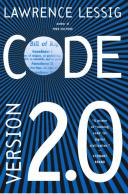Книга: Code 2.0
is the way it is the way it must be?
is the way it is the way it must be?
The rise of an electronic medium that disregards geographical boundaries throws the law into disarray by creating entirely new phenomena that need to become the subject of clear legal rules but that cannot be governed, satisfactorily, by any current territorially based sovereign.
Some things never change about governing the Web. Most prominent is its innate ability to resist governance in almost any form.
If there was a meme that ruled talk about cyberspace, it was that cyberspace was a place that could not be regulated. That it “cannot be governed”; that its “nature” is to resist regulation. Not that cyberspace cannot be broken, or that government cannot shut it down. But if cyberspace exists, so first-generation thinking goes, government’s power over behavior there is quite limited. In its essence, cyberspace is a space of no control.
Nature. Essence. Innate. The way things are. This kind of rhetoric should raise suspicions in any context. It should especially raise suspicion here. If there is any place where nature has no rule, it is in cyberspace. If there is any place that is constructed, cyberspace is it. Yet the rhetoric of “essence” hides this constructedness. It misleads our intuitions in dangerous ways.
This is the fallacy of “is-ism” — the mistake of confusing how something is with how it must be. There is certainly a way that cyberspace is. But how cyberspace is is not how cyberspace has to be. There is no single way that the Net has to be; no single architecture that defines the nature of the Net. The possible architectures of something that we would call “the Net” are many, and the character of life within those different architectures is diverse.
That most of us commit this fallacy is not surprising. Most of us haven’t a clue about how networks work. We therefore have no clue about how they could be different. We assume that the way we find things is the way things have to be. We are not trained to think about all the different ways technology could achieve the same ends through different means. That sort of training is what technologists get. Most of us are not technologists.
But underlying everything in this book is a single normative plea: that all of us must learn at least enough to see that technology is plastic. It can be remade to do things differently. And that if there is a mistake that we who know too little about technology should make, it is the mistake of imagining technology to be too plastic, rather than not plastic enough. We should expect — and demand — that it can be made to reflect any set of values that we think important. The burden should be on the technologists to show us why that demand can’t be met.
The particular is-ism that I begin with here is the claim that cyberspace can’t be regulated. As this, and the following chapters argue, that view is wrong. Whether cyberspace can be regulated depends upon its architecture. The original architecture of the Internet made regulation extremely difficult. But that original architecture can change. And there is all the evidence in the world that it is changing. Indeed, under the architecture that I believe will emerge, cyberspace will be the most regulable space humans have ever known. The “nature” of the Net might once have been its unregulability; that “nature” is about to flip.
To see the flip, you must first see a contrast between two different cyber-places. These two cyber-places are ideal types, and, indeed, one of the two ideals no longer exists anywhere on the Net. That fact is confirmation of the point this section aims to make: that we’re moving from one Internet to another, and the one we’re moving to will be significantly more regulable.
The following descriptions are not technical; I don’t offer them as complete definitions of types of networks or types of control. I offer them to illustrate — to sketch enough to see a far more general point.
- SCTP INIT chunk
- SCTP INIT ACK chunk
- Creating the Partition Table
- Creating the File System on the Partitioned Disk
- 6.5.2. Midway
- 6.6. OBJECT-BASED DISTRIBUTED SHARED MEMORY
- 3.3.2 Waiting on a condition variable
- 8.1.5 Never share condition variables between predicates
- 4.4.4 The Dispatcher
- About the author
- Chapter 7. The state machine
- Appendix E. Other resources and links




